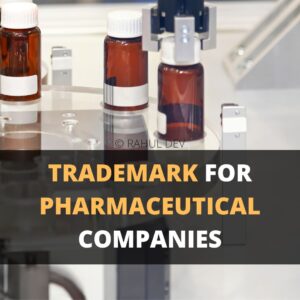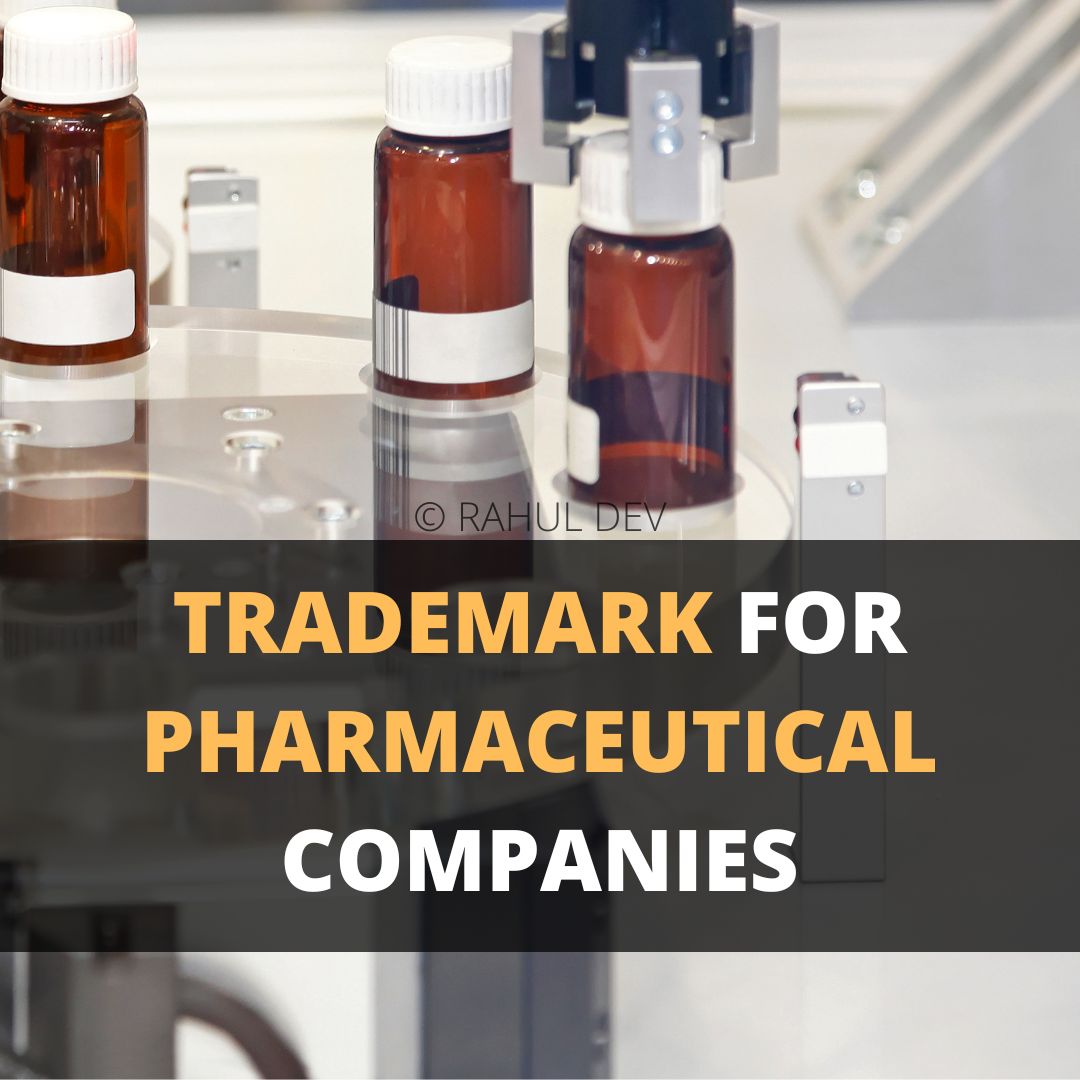Importance of Pharmaceutical Trademarks
For pharmaceutical companies, a strong pharmaceutical trademark is essential for building brand recognition and trust among consumers. With so much competition in the industry, it’s important to have effective strategies in place to protect your trademark and ensure its success. This comprehensive article about pharmaceutical trademarks and role of pharmaceutical trademark attorney is aimed at discussing various aspects and strategies focusing on how to secure your pharmaceutical trademark and maintain your brand’s reputation.
Owing to rapid growth of pharmaceuticals and medical devices, trademarks have become crucial in the pharmaceutical industry as they help to distinguish one company’s products from another’s. This is especially important in the case of prescription drugs, where patients rely on the brand name to ensure they are receiving the correct medication. Trademarks also help to build brand recognition and loyalty, which can be valuable in a highly competitive market. Additionally, trademarks can protect a company’s investment in research and development by preventing others from using similar names or packaging to market their own products.
What is Pharmaceutical Trademark?
Pharmaceutical trademark refers to the unique name, symbol, or design that identifies and distinguishes a particular pharmaceutical product from others in the market. It is a form of intellectual property protection that helps prevent confusion among consumers and allows pharmaceutical companies to establish brand recognition and loyalty. A pharmaceutical trademark registration helps to distinguish a pharmaceutical drug from others in the market. It represents the reputation and quality of the drug and is a key part of the drug’s branding. For legal protection, pharmaceutical companies need to register their trademarks with the relevant agencies to protect them legally, including filing of international trademark application through WIPO Madrid Protocol. This prevents other companies from using similar marks that could confuse consumers. From a marketing perspective, an attractive and memorable trademark can significantly impact a drug’s success in the market. It can resonate with the target audience and help to build a strong brand image. Essentially, a pharmaceutical trademark is a crucial aspect of a drug’s identity, legal protection, consumer safety, and marketing success.
What are the 4 types of trademark?
Generally, trademarks can be categorized into four main types:
1. Generic Marks: These are common words or terms that are directly related to the product or service, and as such, they cannot be protected under trademark law. For example, the term “Computer” for a computer manufacturing company would be considered a generic mark.
2. Descriptive Marks: These directly describe some aspect of the product or service. They are not inherently distinctive and are only protected by trademark law if they have acquired a “secondary meaning” in the minds of the public. For example, “Cold and Creamy” for ice cream.
3. Suggestive Marks: These hint at the product or service without directly describing it. They require some imagination on the part of the consumer to connect the mark with the product or service. These are inherently distinctive and are protected by trademark law. For example, “Netflix” for a streaming service.
4. Arbitrary or Fanciful Marks: These have no connection to the product or service and are inherently distinctive. Fanciful marks are invented words with no dictionary or common meaning, while arbitrary marks are existing words that have no connection with the product or service. These are the strongest types of trademarks. For example, “Apple” for computers or “Kodak” for cameras.

What is class 5 in trademark?
As per NICE classification schedule by WIPO, trademark Class 5 is reserved for pharmaceuticals, veterinary preparations, hygiene products, and dietetic substances. This classification is part of an international system used to categorize and protect intellectual property in different sectors. If your product or brand is related to the healthcare or wellness industry, obtaining a trademark in Class 5 can be a strategic move. It can help distinguish your product or service from competitors and protect your intellectual property rights. However, it’s important to note that this class may not be relevant for businesses outside of the healthcare and wellness industry. Before beginning the trademark registration process, it is crucial to understand which class is most applicable to your product or service to ensure appropriate protection. In summary, Trademark Class 5 is an important classification for businesses in the pharmaceutical, healthcare and wellness sectors, providing a means to protect and distinguish their products and services in the marketplace.
What is the best type of trademark?
The best type of trademark is one that is unique, memorable, and easily recognizable. It should accurately represent your brand and resonate with your target audience. From a legal perspective, the best trademarks are those that are registered, distinctive, and can be defended against infringement. From a marketing standpoint, the best trademarks are those that are easy to remember, have a strong visual appeal, and effectively communicate your brand identity. From a consumer’s perspective, the best trademarks are those that are simple, easy to pronounce, and represent a trustworthy brand that delivers quality products or services. In summary, the best type of trademark is one that combines legal protection, marketing appeal, and consumer recognition. It should be distinctive, memorable, and representative of your brand’s identity, while also being legally defensible and resonating with your target audience.
How to obtain international trademark protection?
As a part of strong trademark strategy, obtaining international trademark protection involves several steps and considerations. An experienced trademark lawyer can guide you through the international registration process and help conduct a comprehensive search on existing international trademarks to avoid conflicts. It’s important to understand the laws and regulations related to trademarks in the countries where you plan to do business. This can help ensure that your business complies with all necessary rules. Depending on your pharmaceutical business goals, you may consider applying for trademark protection in each individual country where you conduct business. This can provide more comprehensive protection for your pharmaceutical trademark. Also, an Intellectual Property Manager can help ensure that your application is properly filed and can assist in monitoring and protecting your trademark over time. In summary, obtaining international trademark protection involves a combination of legal consultation, research, individual applications, ongoing management, and understanding of local business contexts. It’s a complex process that requires careful planning and execution.
Conducting a Comprehensive Trademark Search
Before you begin using a new pharmaceutical trademark, it’s important to conduct a comprehensive pharmaceutical trademark search to ensure that it’s not already in use by another company. This can help you avoid potential legal issues and protect your pharmaceutical brand’s reputation. A pharmaceutical trademark search should include not only the USPTO database, but also WIPO Global Brand Databasealong with common law sources such as business directories and industry publications. It’s also a good idea to work with a pharmaceutical trademark attorney who can help you navigate the pharmaceutical trademark search process and identify any potential conflicts.
Pharmaceutical Trademark Filing
As a pharmaceutical company, your trademark is one of your most valuable assets. It’s important to file for trademark protection as early as possible to ensure that your brand is protected from potential trademark infringement. This can help you avoid costly legal battles and protect your brand’s reputation. Filing for trademark protection early also allows you to establish your brand in the marketplace and build pharmaceutical brand recognition among consumers. Working with a trademark attorney can help ensure that your trademark application is filed correctly and that your brand is protected from potential infringement.
Monitor Your Pharmaceutical Trademark for Infringement
Once you have secured trademark protection for your pharmaceutical brand, it’s important to monitor for potential infringement. This includes monitoring for unauthorized use of your trademark by competitors or other third parties. You can do this by conducting regular searches for your trademark online and in the marketplace. If you do identify potential infringement, it’s important to take action to protect your brand. This may include sending cease and desist letters or pursuing legal action against infringers. Working with a trademark attorney can help ensure that you are taking the appropriate steps to protect your brand from infringement.
Enforce Your Pharmaceutical Trademark Rights
Enforcing your trademark rights is crucial to maintaining the reputation and success of your pharmaceutical brand. This involves taking action against any unauthorized use of your trademark by competitors or other third parties. Failure to enforce your trademark rights can lead to dilution of your brand and loss of market share. It’s important to work with a trademark attorney to develop a strategy for enforcing your trademark rights and taking appropriate legal action when necessary. This can include sending cease and desist letters, filing infringement lawsuits, and seeking damages for any harm caused to your brand.
CLICK HERE FOR AI STARTUP VALUATION GUIDE
In this age of rapid technological advancements and fierce competition, a proactive approach towards innovation, strategic planning, and legal preparedness is paramount for success. CEOs who embrace this mindset will undoubtedly lead their companies to new heights, creating lasting impact and value in the world of business.
Our team of advanced patent attorneys assists clients with patent searches, drafting patent applications, and patent (intellectual property) agreements, including licensing and non-disclosure agreements.
Advocate Rahul Dev is a Patent Attorney & International Business Lawyer practicing Technology, Intellectual Property & Corporate Laws. He is reachable at rd (at) patentbusinesslawyer (dot) com & @rdpatentlawyer on Twitter.
Quoted in and contributed to 50+ national & international publications (Bloomberg, FirstPost, SwissInfo, Outlook Money, Yahoo News, Times of India, Economic Times, Business Standard, Quartz, Global Legal Post, International Bar Association, LawAsia, BioSpectrum Asia, Digital News Asia, e27, Leaders Speak, Entrepreneur India, VCCircle, AutoTech).
Regularly invited to speak at international & national platforms (conferences, TV channels, seminars, corporate trainings, government workshops) on technology, patents, business strategy, legal developments, leadership & management.
Working closely with patent attorneys along with international law firms with significant experience with lawyers in Asia Pacific providing services to clients in US and Europe. Flagship services include international patent and trademark filings, patent services in India and global patent consulting services.
Global Blockchain Lawyers (www.GlobalBlockchainLawyers.com) is a digital platform to discuss legal issues, latest technology and legal developments, and applicable laws in the dynamic field of Digital Currency, Blockchain, Bitcoin, Cryptocurrency and raising capital through the sale of tokens or coins (ICO or Initial Coin Offerings).
Blockchain ecosystem in India is evolving at a rapid pace and a proactive legal approach is required by blockchain lawyers in India to understand the complex nature of applicable laws and regulations.

